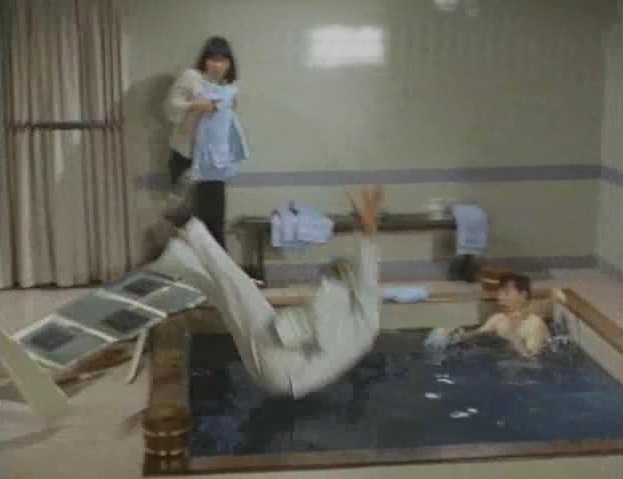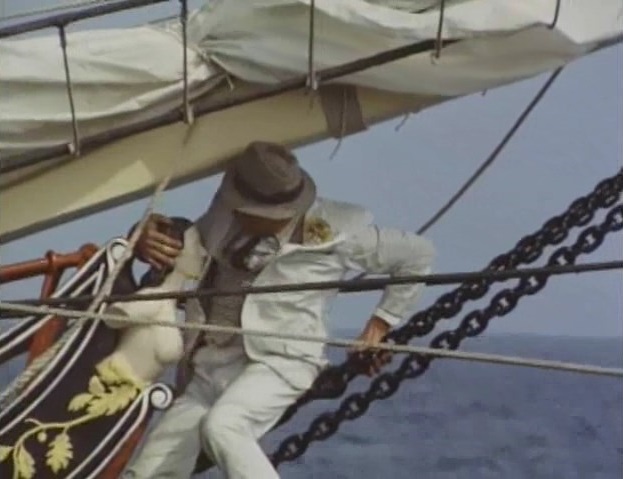Change of Address
The Alfred Hitchcock Hour
An ideally stern little
joke is counterbalanced by the beauty and strangeness of Friedkin’s ideal
direction. The middle-aged husband and wife take a Malibu beach house she hates
unreasonably. He takes a young mistress among the go-go set, kills his wife and
buries her in the basement.
The Sheriff’s
Department sends out a sergeant to investigate the wife’s claim that the
previous owner buried his wife in the basement. After all, there’s no change of
address at the post office for her, they divorced and he still gets her mail.
Friedkin, working
with Kennedy and Thaxter from his own teleplay co-written by Morton Fine (out
of Andrew Benedict’s short story), takes economical views that tell the tale of
the mortgage-burning party that burned the place down amid “sand, rocks and sea...
the edge of the world.”
The punchline is
directed at the notion that historical precedents of floy-floy and Charleston
had the grace of innocence about them.
The McGregor Affair
The Alfred Hitchcock Hour
Burke & Hare,
Dr. Knox and “a burdened man” who carries corpses to the Medical Museum as
“tanbark” for “a little thing” in the form of a gratuity and small wages, that
keep his wife in drink until she snores. By and by he resolves to do away with
her. The resurrectionists accept the noisy gift outside their door, the heavy
load is borne by McGregor, this time without a tip.
Now he has a drop
to drink and a bed to loll in, but now the poor man misses his Aggie in a
terrible way. His loose lips threaten the enterprise, so that when Dr. Knox
opens the latest shipment, his students remark, “he that carried the box is now
in the box.”
Elsa Lanchester
in a classic foreshortened posture from the foot of the bed achieves an
astonishing resemblance to Dylan Thomas in her penultimate scene. Andrew Duggan
as McGregor, John Hoyt as Dr. Knox, an adumbration of Jean-Pierre Cassel in
Losey’s La Truite (“où est
Lou?”), and a bit of Robert Burns,
|
As father Adam first was fool’d, |
Crimson Witness
The Alfred Hitchcock Hour
It was William
Friedkin who directed Pinter’s The Birthday Party, here David Friedkin has something
related to The Tea Party. An executive at Baldwin Mills, Inc. finds his secretary
and mistress suddenly disenchanted, his wife leaves him for his brother, and
Mr. Baldwin explains a “great leap forward” by the company needs this same
brother as plant manager replacing the executive demoted to the pool of cost
estimators, who share a secretary.
It will be noted
that Mr. Baldwin’s secretary is Chinese. The subsequent murder of the usurper
is solved by the police when a petal from the former executive’s boutonniere, a
rose, is found at the scene of the crime.
The extent of the
analysis reveals a superficial fascination exerted by the brother over women
and Mr. Baldwin, which vanishes upon his death. The executive, in a performance
beyond masterly by Peter Lawford (amid a cast of great actors sharply
directed), is by contrast merely “nice”.
Thou Still Unravished Bride
The Alfred Hitchcock Hour
The strangeness
is partly attributable to an evocation of the English mind, but compare the very same effect at Malibu in “Change of
Address”.
An American girl
in London takes a walk on her wedding day. The bridegroom is with Scotland
Yard, he and his partner retrace her steps, a strangler is after thirtyish
women. “Lovely,” he calls her, “from within, she likes poetry, Keats, Shelley,
Lord Byron, that sort of thing.”
Her first stop
was at a chemist’s to buy some makeup. The chemist’s son followed her to a
bookshop but didn’t speak to her, “that would have spoiled it.” The bookseller
was prevailed upon to read a bit of Endymion to her, and the “Ode to a
Grecian Urn”, which “stirred his old bones,” then she bought a
privately-printed limited edition, there was something of the victim about her.
He names the pub where she was going with her guidebook (along the way a
chippie understood her to be a colleague). The strange young man she met at the
pub is still there. “I hunt people,” he says, by talking to them so that he
learns “what makes them cripples inside”. He shows the policemen where he threw
her into the river.
The bridegroom
goes to inform her parents, and finds her alive, all doubts resolved. His
partner sees quite another girl brought out of the water.
These are the
stages by which poetry is understood, off-putting, admirable, inspiring,
maddening and finally comprehensible.
Chrysanthemum
I Spy

Code name,
“Frenchman, naturalized, been with us since World War II.”
Quemoy and Matsu.
The schooner Shanghai Belle, Hong Kong (Robinson in
straight sets, Scott critical of his net game).
“One of the
biggest foul-ups in the annals of espionage. The absolute biggest.” Peckinpah remembers the machine gun in The Wild Bunch, Ritchie in The Island.

Cross Your Heart and Hope to Die
Kojak
An analysis of
Hitchcock primarily centering on Rear Window, taking Norman Bates as the
chiefest of sinners, equating the invalid with Marnie, and acquitting the
murderess in Blackmail.
The sublime
sequence that almost cracks a smile has the ailing mother stumble out of her
bedroom, sweep aside her boy’s eavesdropping devices and open the chest
supporting them, from which she removes a doctor’s bag expecting to find her
medicine, but instead she pulls out a bloody glove and keels over (Rope).
Catatonia at the end
suggests The Wrong Man.